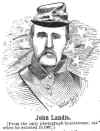John Landis was born in Allen county, Kentucky, October 29, 1827; he moved to what is known as the Platte purchase in Missouri in 1842.
He volunteered and went to the Mexican war in 1846; served for 18 months under General Zachariah Taylor; was in the battles of Palo Alto, Reseca de la Palma and Buena Vista.
 He then returned to Missouri, was married at St. Joseph in 1848 to Miss Mary E. Langstone.
Eleven children were born to them, six of them still living. He moved to Doniphan county, Kansas in 1864; he was elected to the constitutional convention that met in Topeka October 23, 1855, which afterward become known in history as the "Topeka Constitutional Convention;" he was
also representative from Doniphan county in the free state legislature that was chosen under it in
January that met in Topeka March 4, 1856. This was the legislature that was dispersed by United States troops under General Sumner.
Landis up to this time had been a Democrat but was elected to both the convention and legislature as a free state man. He then returned to Missouri, was married at St. Joseph in 1848 to Miss Mary E. Langstone.
Eleven children were born to them, six of them still living. He moved to Doniphan county, Kansas in 1864; he was elected to the constitutional convention that met in Topeka October 23, 1855, which afterward become known in history as the "Topeka Constitutional Convention;" he was
also representative from Doniphan county in the free state legislature that was chosen under it in
January that met in Topeka March 4, 1856. This was the legislature that was dispersed by United States troops under General Sumner.
Landis up to this time had been a Democrat but was elected to both the convention and legislature as a free state man.
What little information we have of him up to this time leads us to the conclusion that he affiliated with the Douglas wing of his party. He had no sympathy with the whigs or abolitionists but rather leaned toward the free soilers.
It is uncertain whom he would have supported for president in 1856, had he lived where he could have voted for electors; but the presumption is he would have voted for James Buchanan, although at that time he was not pleased with the action of his party on the slavery question.
He voted for James H. Lane (democrat) who was elected as president of the convention, and later voted with his party against striking the word ''white" out of the constitution, having been born and reared in slave states he felt friendly toward the slave interests.
He favored the strict enforcement of the fugitive slave law; but was opposed to the extension of slavery into the Territories.
He recognized in the "Dred Scott decision" if carried out to its logical conclusion a scheme to extend slavery anywhere the slave owner felt disposed to carry them.
Douglas and his adherents in the north took the ground that the bad effects of that decision could be
neutralized by unfriendly legislation by congress. While the republican party under the leadership of Seward, Lincoln and Greeley, insisted that a change of administration was necessary which would naturally lead to a reorganization of the supreme court and
eventually to a reversal of the infamous decision. Landis soon found himself involuntarily drifting toward the republican party; so when the National campaign of 1860 was opened Landis was a radical republican and an ultra abolitionist.
The pro-slaveryites and border ruffians heaped so many indignities and wrongs on free-state men under the guise of law which crimes were either sanctioned in advance or afterward condoned by the territorial officers, that Landis with thousands of other
anti-slavery men was
|